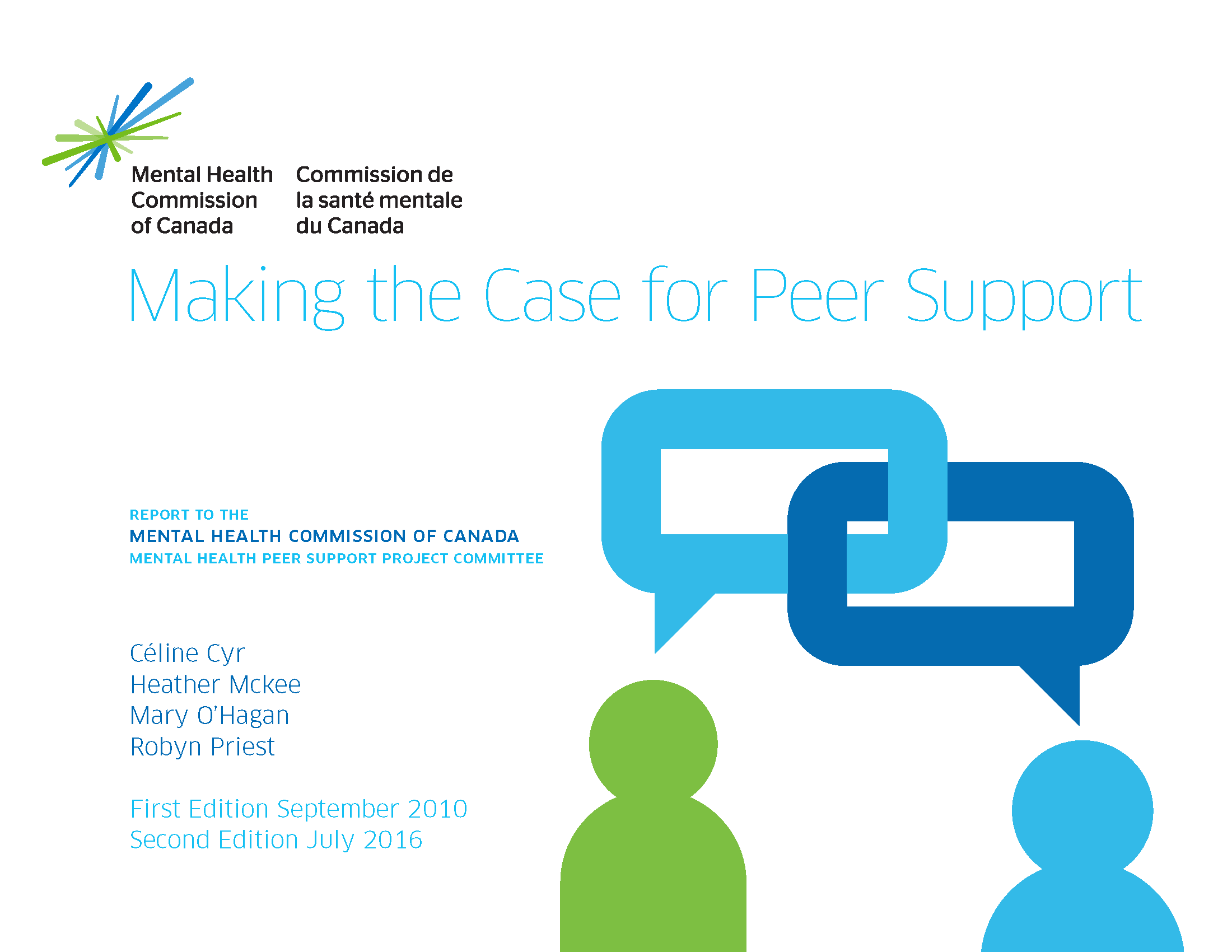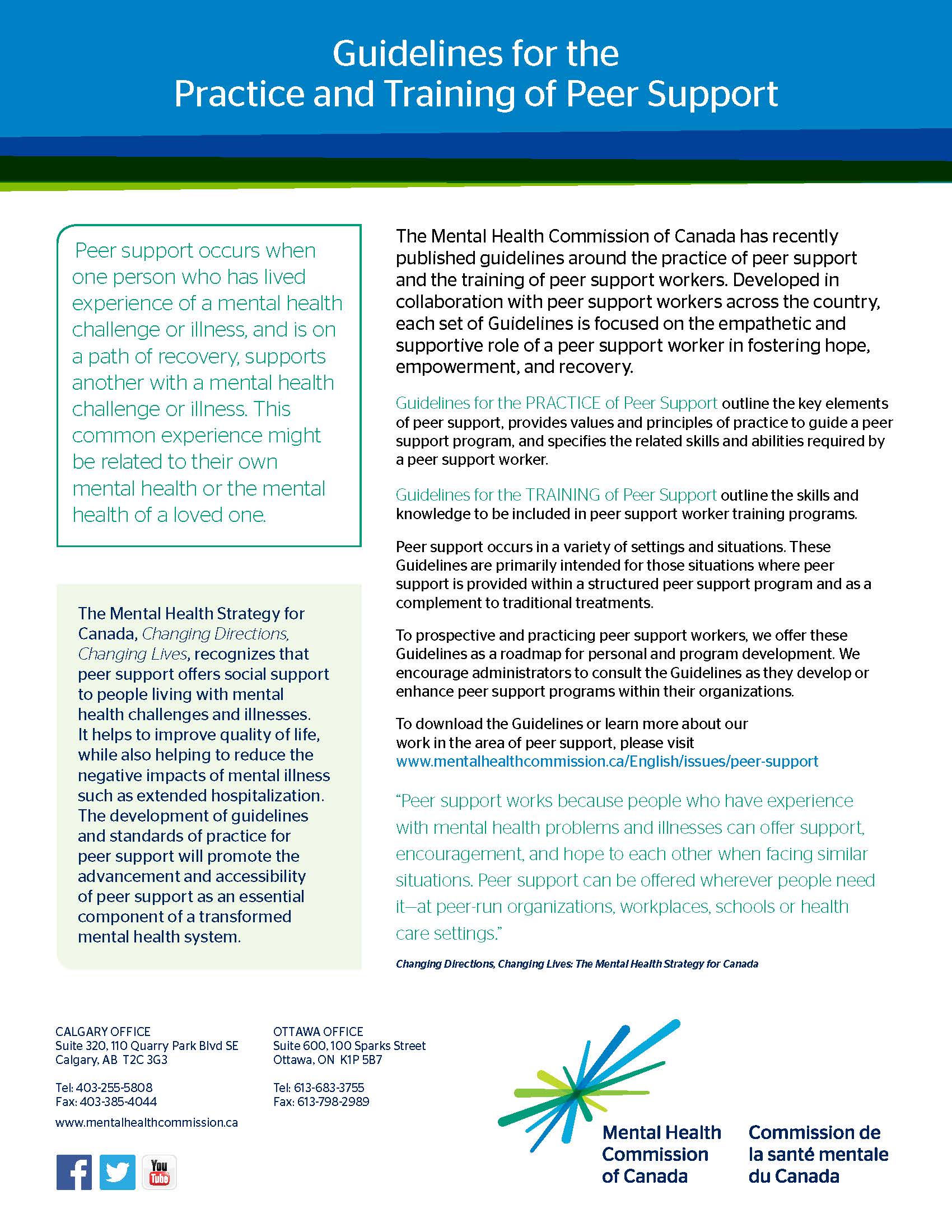If you are in distress, you can call or text 988 at any time. If it is an emergency, call 9-1-1 or go to your local emergency department.
Making the Case for Peer Support
Executive Summary Over 600 individuals from across Canada took part in focus groups and interviews. Another 220 people offered their input through written and online surveys. Together, this wide variety of people living with mental health problems and illnesses have worked together to create this report. Together, we want to share with the Mental Health Commission of Canada, and Canadians who look to the Commission for leadership, our experiences with peer support — to describe it, to make the case for it, and to make recommendations on how the Commission can join with us to support its development. We also reviewed Canadian and international research, government policy statements, evaluation reports, and other “grey” literature. This report describes what we heard and learned from many sources and many people. Peer support works. Peer support is effective. Canadian research has contributed significantly to our knowledge base. Several experimental and quasi-experimental studies have demonstrated not only the benefits to individuals involved, but also to the mental health system and communities as a whole, by saving millions of taxpayer dollars by reducing the use of the most expensive types of services. The key to the success of peer support programs — both those that are independently run and those that are located within mainstream mental health organizations—is to hold on to the values of peer support and its unique features, while at the same time providing adequate funding and support to run efficient and effective programs. Research shows that the values and processes of peer support—among them, recovery, empowerment, and hope—help individuals develop the skills they need to take charge of their lives and help change mental health services so that they can better contribute to the recovery process. Mental health professionals and organizations are key partners in the ongoing growth of peer support across Canada. The development of peer support has been boosted by the recovery philosophy, which policymakers and service providers have placed at the centre of mental health policy in many jurisdictions across the world. Whatever shape it takes (e.g., support groups, one-to-one support, social activities, recovery education, social enterprises, or advocacy services), a variety of stakeholders have an interest in ensuring that more people become aware of, are referred to, and can take part in peer support. While peer support can take place in self-help groups in a local community centre, faith community, or mental health service with no more funding than what is needed for refreshments, increasingly small, but important, amounts of government health funding are being invested into these services. From peer specialists helping people who are leaving the hospital to million-dollar consumer-run services and alternative businesses, leadership from government, as well as champions from mental health services and other sectors, can dramatically increase access to this evidence-based option. Research knowledge, as well as the knowledge gained from the lived experience of people who take part in peer support, shows the remarkable improvements in people’s lives that can occur even with relatively small investments. But there are still many challenges to the sustainability and growth of peer support. Growth is uneven across the provinces at the levels of legislation, policy, funding, development, and provision. Ontario, British Columbia, New Brunswick, and Quebec appear to be furthest ahead in the development and support of peer support services, yet they still have a long way to go. While research shows that people from many backgrounds can benefit from the peer support process, we found that it was primarily white, middle-aged, and urban mental health consumers who have been the face of the peer support movement. Aboriginal respondents said they have their own equivalents to peer support which have mental health benefits, but these are not recognized or funded by government or mainstream service organizations. Enhanced investment is needed to offer peer-provided, value-based training to people interested in being peer support providers. This will increase the number of people confident in their ability to work in a peer support role, who are paid a living wage, and who work in workplaces that have accommodations and flexible disability income benefit programs. The growth in the number of peer specialists and services in mainstream mental health services can help build positive relationships between colleagues working in both independent and mainstream services. Respondents were clear, however, that there are also challenges inherent in this growth that cannot be ignored. Peers working in mainstream mental health service organizations are often in large bureaucratic settings, where they may be but a small add-on, meaning there is risk of their values getting swamped. Some peers working in mainstream settings describe feeling dominated by professionals who do not understand the value of their work. Ongoing system change and training for professionals to develop the skills to work in and deliver recovery-oriented, anti-oppressive services in partnership with peer providers is required. Peer support providers and organizations also face change as our values and programs become more integrated into the mainstream. We will need to continue to work to create our own groups and services, acknowledge the peers who have been excluded from our movement, and reach out to work equitably with them. Negotiation with service systems, with which many of us have had negative and coercive experiences, is also important. Advocacy, research, evaluation, and leadership skills are needed to be able to contribute to this process, as does the ability to maintain hopefulness in a time of increasing pressures on the health care system. A robust and growing research evidence base shows peer support is associated with:
People with lived experience of mental health problems and illnesses from across Canada have contributed to the Making the Case for Peer Support project by sharing their experiences with peer support in their recovery journeys — francophones from Quebec and New Brunswick; young people overcoming a first episode of psychosis in Halifax; First Nation, Métis and Inuit peoples from downtown Toronto and northern British Columbia; and women with schizophrenia staying in peer-run crisis support services.
People with lived experience of mental health problems or illnesses can offer huge benefits to each other. We found that the development of personal resourcefulness and self-belief, which is the foundation of peer support, can not only improve people’s lives but can also reduce the use of formal mental health, medical and social services. By doing so, peer support can save money.
Most respondents agreed that peer support needs to continue to develop both inside and outside the mainstream mental health system. Independent peer-run organizations require policy, administrative, and funding support to build and maintain strong infrastructures. Positive working relationships with mainstream service providers need to be cultivated through good communication and working honestly through differences.
SHARE THIS PAGE
RELATED

Review our Assessment Framework for Mental Health Apps — a national framework containing key standards for safe, quality, and effective mental health apps in Canada.

To help expand the use of e-mental health services, we developed four online learning modules based on our Toolkit for E-Mental Health Implementation, in collaboration with the Centre for Addiction and Mental Health (CAMH).

Stepped Care 2.0© (SC2.0) is a transformative model for organizing and delivering evidence-informed mental health and substance use services.

